We believe that enduring, Native-led stewardship can and will transform the Colorado Plateau.
Too often, Native leaders do not receive the support that they need to nurture and build out their excellent work. The Colorado Plateau Foundation exists to address this gap, bringing national philanthropic dollars home to strengthen Native organizations on the Colorado Plateau.
Our Approach
- Place based expertise
- Culturally centered giving
- Bridging access to the philanthropy
- Building a regional network
OUR MISSION
Colorado Plateau Foundation connects the philanthropic community to on-the-ground initiatives by growing a sustainable supply of resources and giving grants that enhance the work of Native-led organizations on the Plateau.
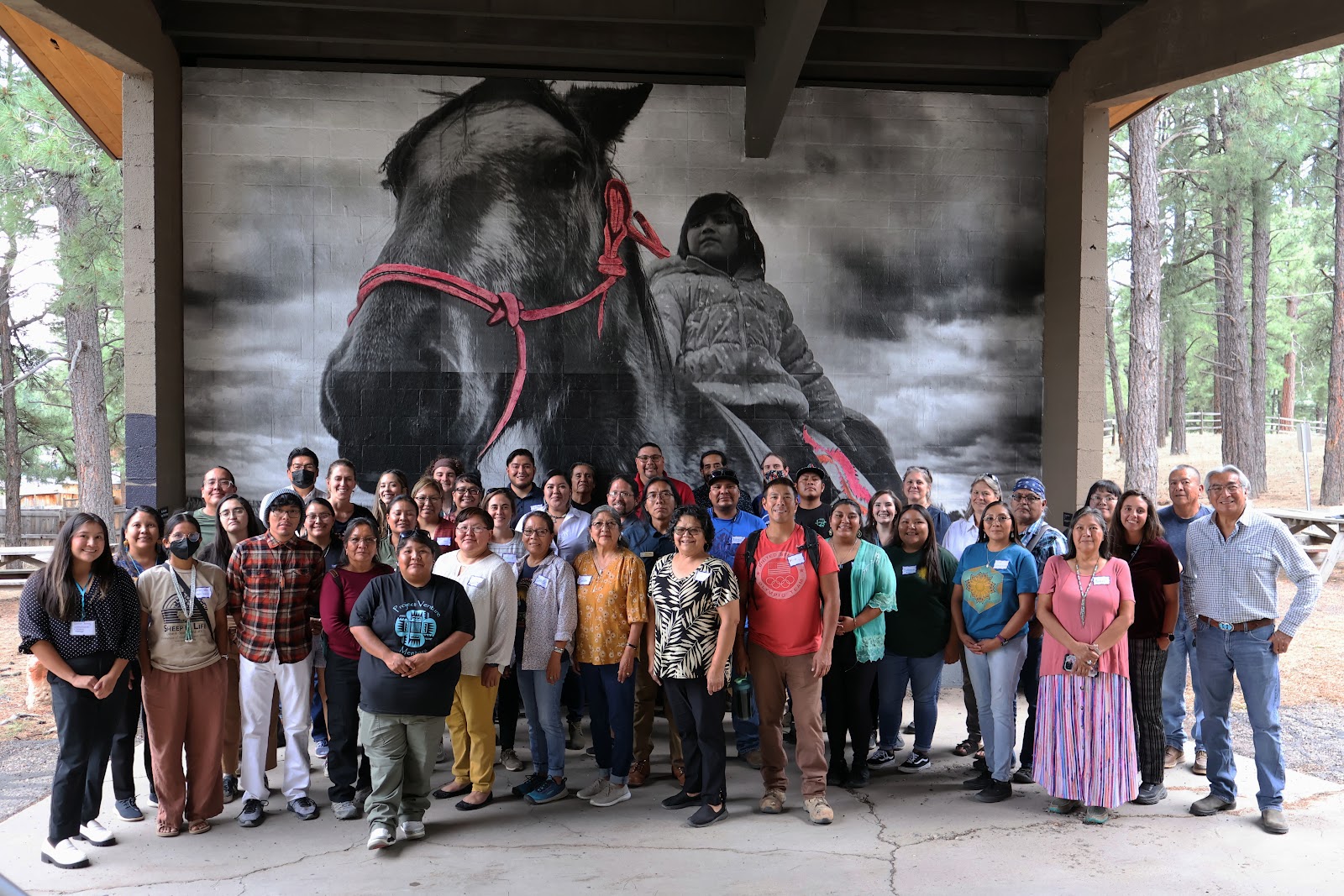
What We Do
The Colorado Plateau Foundation emerged to address a regional need for a bridge between the Colorado Plateau’s Native communities and the national philanthropic community. The power of Native American tribes as sovereign nations, as governments that oversee over a third of the Colorado Plateau’s lands, and as the original stewards of this landscape, renders Native leadership necessary to achieve any meaningful and authentic change on the Colorado Plateau. Yet few philanthropic dollars are reaching native communities nationwide, much less on the Colorado Plateau where vast distance compound access challenges and funders may be unfamiliar with how to partner with tribal communities.
The Colorado Plateau Foundation recognizes that Native-led organizations are already addressing important issues in their communities and across the Plateau, and creating real and positive momentum in Indian country. We respond to community needs and seek direction from cultural and community leaders in order to identify key focus areas for work on the Plateau, including protection of water, protection of sacred sites and endangered landscapes, language revitalization, and sustainable, community-based agriculture. CPF gives grants in these priority areas to Native led-organizations and tribal entities on the Colorado Plateau in amounts between $1,000 and $25,000.
We have seen the immense power of Native people to catalyze change. The Colorado Plateau Foundation is committed to supporting Plateau communities in perpetuity.
Our Vision
The Colorado Plateau Foundation envisions thriving Native-led organizations creating movements and momentum in their communities, supported by bold philanthropic giving and a robust shared learning network.
Our Values
We value a culturally centered model of giving that emphasizes long-term relationships and meeting grantees where they are in their development.
We value the knowledge of Native people on the Colorado Plateau, who are already developing solutions to their most significant challenges and can meet those challenges.
We value equity and fair distribution of resources which requires changing asymmetrical power dynamics at all levels of influence and authority.
We value justice, equity, diversity, and inclusion because we know that to solve the most complex problems requires employing the broadest spectrum of talents, skills, and imagination.

Since 2012 we have given $5.1 million to 220+ Native-led initiatives

Given In
Grants

Native Initiatives Supported
Who We Are
Our team believes in the Colorado Plateau and its Native people. Together, we support our grantees’ excellent work by connecting the Colorado Plateau’s Native people to the world of philanthropy. The CPF staff is deeply informed about the Plateau’s Native communities including their economic, cultural, social, and political outlooks.

We Live Where We Serve

Jim Enote
Chief Executive Officer
Jim Enote is a Zuni tribal member and CEO of the Colorado Plateau Foundation. He serves on the boards of the Trust for Mutual Understanding, Grand Canyon Trust, and formally with Jessie Smith Noyes Foundation. He is a National Geographic Society Explorer, a New Mexico Community Luminaria, and an E.F. Schumacher Society Fellow.
Jim’s service the past forty years includes natural resource, cultural resource, philanthropic, and arts assignments for many organizations including UNESCO, UNDP, International Secretariat for Water, Nordic Council of Ministers, Tibet Child Nutrition Project, the Mountain Institute, National Geographic Society, US Bureau of Indian Affairs, US National Park Service, Zuni Tribe, and several major charitable foundations, museums, and universities. He has written in Heritage In the Context of Globalization; Science, Technology, and Human Values; Sacredness as a Means to Conservation; Mapping Our Places; Indigenous People and Sustainable Development; A:shiwi A:wan Ulohnanne, and Redrock Stories, to name a few. Recent short pieces include; We Cannot Live by Sentiments Alone, The Museum Collaboration Manifesto, Buyer Beware, What I Tell Boys, and Please Don’t Call Me a Warrior.
In 2010 while serving as the director of the A:shiwi A:wan Museum Jim was awarded the first Ames Prize for Innovative Museum Anthropology during the American Anthropological Association’s annual conference. In 2013 he received the Guardian of Culture and Lifeways Award from the Association of Tribal Archives, Libraries, and Museums, and in 2016 received the Hewett Award for leadership and service to the New Mexico museum community and for achievements in the museum field. He lives in his work in-progress home at Zuni, New Mexico.

Heather Herold
Director of Grants & Operations
Heather Herold was born and raised in southern Arizona and moved north more than a decade ago. Heather previously worked for the Grand Canyon Trust in the Native American program and was a staffer for the Bears Ears Inter-Tribal Coalition and Bears Ears Commission. She also worked with the Native American Business Incubator Network during her time at the Trust. Previously, Heather was a cultural competency researcher for the Partnership for Native American Cancer Prevention. Additionally, she has worked with the Applied Indigenous Studies and Anthropology Departments at Northern Arizona University and the Museum of Northern Arizona as a researcher and educator. She brings experience in nonprofit finance and management, grant writing, project management, federal Indian law and policy, cultural competency in research, heritage resource policy, and conservation. Heather holds two bachelor of arts degrees in anthropology and applied Indigenous studies, and a master of arts in research anthropology from Northern Arizona University. She is a Certified Nonprofit Accounting Professional. Heather serves on the Board of Directors for Kino School, an alternative non-profit educational institution in her hometown. She enjoys a good cup of coffee, a stack of books, gardening, and spending time with her husband, two cats, and three dogs.

Marissa Nuvayestewa
Program Officer
Marissa Nuvayestewa is Corn Clan from the Village of Tewa. She currently serves on the Board of Hopivewat Resource & Learning Center. Her experience has taught her the importance of strengthening communities from within and working closely with community organizations helping to build local capacity. Marissa received her Master Degree in Social Work with emphasis in Social and Economic Development in Native American Communities from Washington University in St. Louis’ George Warren Brown School of Social Work. She brings professional experience of facilitation, strategic planning, board development, fundraising, program evaluation, and research. She finds enjoyment harvesting local edible plants, running the local trails, and fishing.

Darrien Benally
Communications and Outreach Manager
Darrien Benally is a member of the Navajo tribe. Her clans are Tł’ízí lání, the Manygoats clan, born for Naakai Dine’é, the Mexican People clan. Darrien was born and raised in Flagstaff, Arizona where she currently resides. Darrien received her Bachelor of Science degree in Applied Indigenous Studies with a minor in Environmental Sustainability from Northern Arizona University in May 2019. Darrien has experience as an environmental educator and in the area of environmental communication. She has worked with the Tulalip Tribes of Washington and Tribal Healthy Homes Network regarding wildfire smoke communication for Tulalip Bay residents. Darrien has learned the value of intergenerational engagement and empowerment in working with communities to address social and environmental issues. Darrien has locally participated in mental health advocacy work for Indigenous youth and families. In her downtime, Darrien enjoys spending time outdoors fishing, hiking, and camping. Additionally, she enjoys curating her talents in baking, being a home cook, and gardening.

Rebekah Chattin
Strategies and Partnerships Associate
Rebekah Chattin grew up between the Navajo Reservation and Zuni Pueblo. Her clans are Dibé Łizhiní, the Black Sheep Clan, and born for Naasht’ézhí Dine’é, the Zuni people. She currently lives in Flagstaff where she is in her final year of her bachelor’s degree program at Northern Arizona University studying Applied Indigenous Studies with minors in Chemistry and Indigenous Health Studies. Rebekah has worked in the past primarily under the Partnership for Native American Cancer Prevention as a research assistant, helping research Navajo people’s knowledge and experiences with Helicobacter Pylori Infection. Rebekah is passionate about the importance and need for Indigenous women leaders to address different issues and disparities that Indigenous populations face on and off their homelands. She hopes to continue her studies in the future to gain tools to better improve the conditions of her home tribes as well as those across the United States and abroad. Rebekah enjoys hiking and exploring her homelands, spending time with her siblings, reading, drawing, and baking.

Emily Fredrickson
Operations and Programming Manager
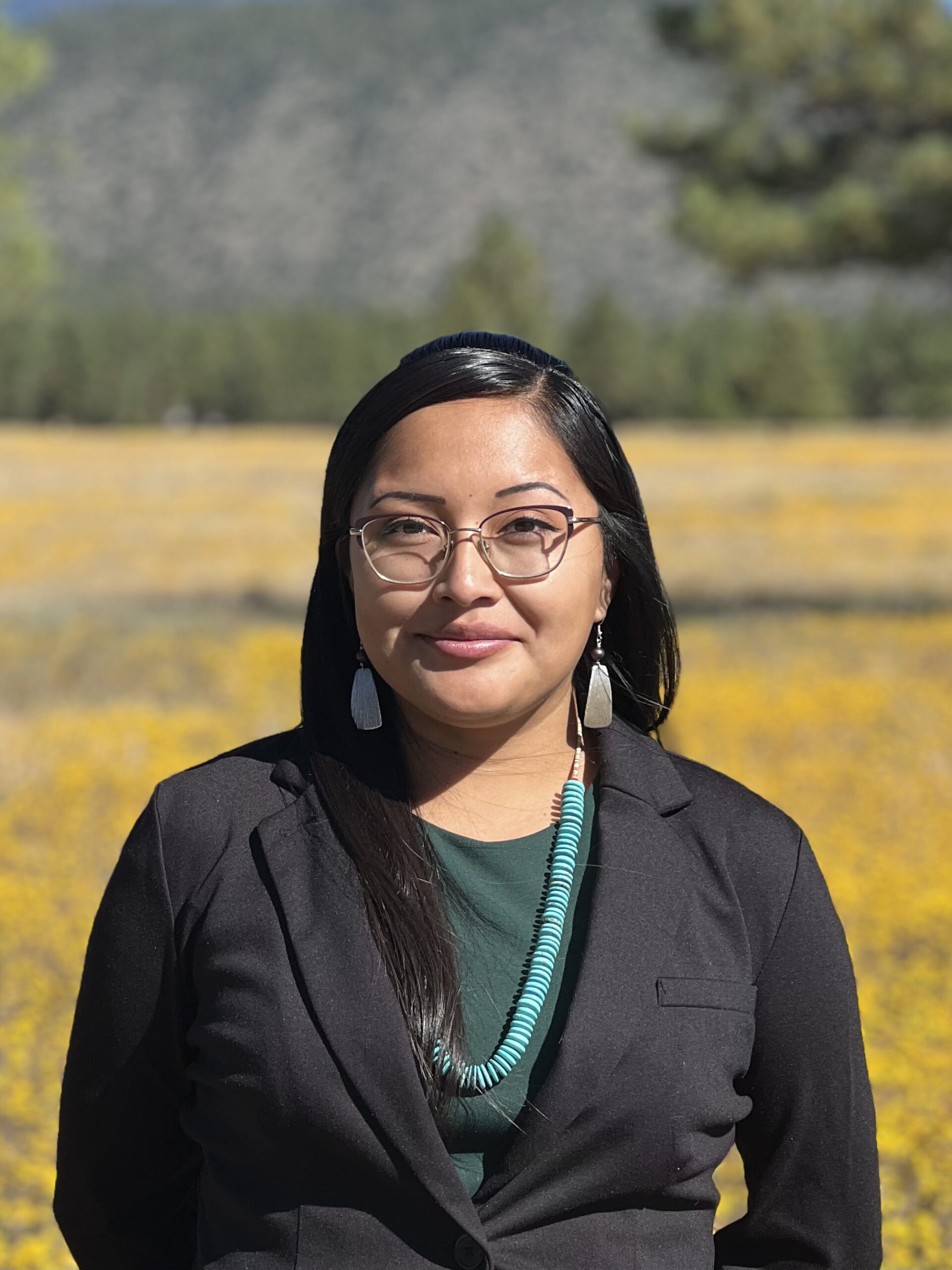
Elizabeth Freeman
Executive Assistant
Elizabeth Freeman is from the Tohono O’odham Nation, Hopi Tribe, Acoma Pueblo, and Navajo Nation. She was born and raised in Flagstaff, AZ, where she resides with her daughter, Nia. Freeman is passionate about serving her communities. She brings experience in program management, event coordination, tribal competency, and advocating for underserved populations. Elizabeth is studying Applied Indigenous Studies with a business and environmental sustainability concentration. She is also actively involved with applying sustainable energy solutions to the Hopi and Navajo Nation through solar technician services. The power of education is a crucial value to Elizabeth, along with collaboration and partnership. She’s delighted to join the team at CPF as the Executive Assistant, where she will continue to evolve into a professional advocate for the inhabitants of the Colorado Plateau.
Elizabeth is a Boys and Girls Club youth mentor in her free time and enjoys reading, traveling, sewing, and learning her Native languages.
Board of Directors
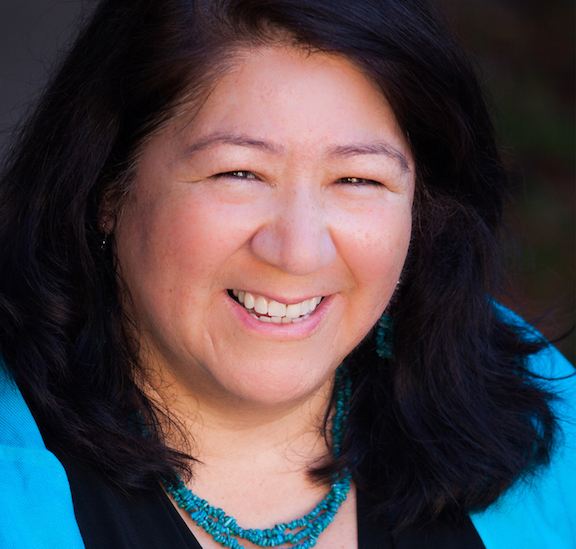
Dr. Angela Gonzales
President
Dr. Angela Gonzales is a Hopi tribal member (Spider Clan) and Associate Professor and Faculty Head of Justice & Social Inquiry in the School of Social Transformation at Arizona State University. Prior to joining the faculty at ASU in 2016, Dr. Gonzales served 10 years on the faculty at Cornell University. As an community-engaged, interdisciplinary scholar, her research cuts across and integrates the fields of sociology, American Indian/Indigenous studies, and public health. Gonzales has received numerous awards, fellowships, and grants for her scholarship, teaching and community service, including the Ford Foundation Diversity Pre-doctoral and Post-doctoral Fellowships, the Cornell Kaplan Award for Public Service, and the Katrin H. Lamon Fellowship at the School for Advanced Research (Santa Fe, NM). Dr. Gonzales strives to embody the Hopi values of sumingnawa and numingnawa. In 2012, she rode her bike over 1,500 miles to raise over $13,000 for the Hopi Cancer Assistance Fund (http://angelabikes4hopi.blogspot.com/). She currently serves on the Board for the Hopi Education Endowment Fund, a community non-profit organization providing grants and scholarships to Hopi college students, is a founding member of the Hopi Alumni Association, an organization of Hopi college and university graduates working to collectively inspire and assist future generations of Hopi college students, and formerly served on the Editorial Board for The Hopi Tutuveni, the official newspaper for the Hopi Nation and previously serve on the Board of Managers for the School for Advanced Research in Santa Fe, NM. Dr. Gonzales holds a Ph.D. in Sociology from Harvard University, a master’s degree from the Harvard Graduate School of Education, and a bachelor’s degree in Sociology from the University of California, Riverside.

Josh Lucio
Treasurer
Josh Lucio is Zuni Pueblo from Zuni, New Mexico. He holds a Bachelor of Science degree in Microbiology from the University of Arizona and he recently earned his Executive Master’s of Business Administration from the University of New Mexico.
Josh joined DreamCatcher Financial Strategies (DCFS) and is a licensed financial professional teaching financial literacy to Native American families. Prior to joining DCFS, he worked for the American Indian Graduate Center as the Scholarship Operations Manager and the Education Coordinator for the Pueblo of Zuni Tribal Scholarship program. In addition, Josh served a number of years as a Reader for the Gates Millennium Scholars Program, an Adjunct Instructor for the University of New Mexico-Gallup branch campus, a board member of College Horizons and Graduate Horizons, Inc., and former Chairman with the New Mexico Tribal Higher Education Commission. He currently volunteers his time serving as a mentor for New Mexico Youth Celebrate Diversity and is the Treasurer for the board of directors for the Colorado Plateau Foundation. Josh enjoys hiking, traveling, and spending time with his daughters.
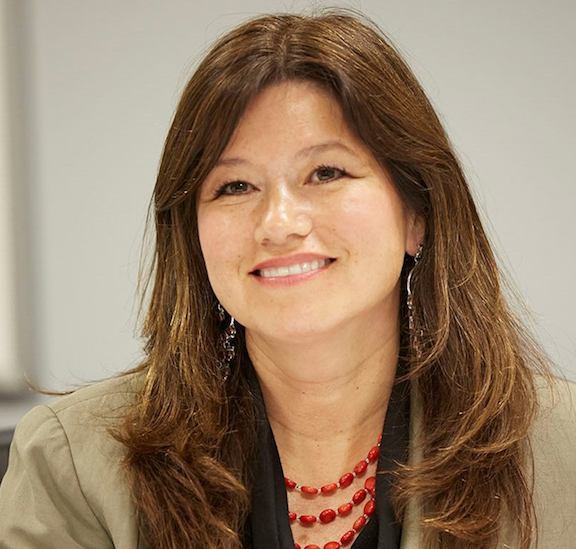
Eileen Egan
Board Secretary
Eileen Egan has partnered for nearly 20 years with non- profit executives, boards and donors to empower them and their organizations to reach their full potential through the effective use of resources and leadership development. Eileen brings a breadth of experience in resource development, program management, facilitation, recruitment, strategic planning, community development and board governance. She has insights into a wide array of nonprofits at the national and regional levels spanning higher education, hospital foundations, and rural organizations. Eileen previously served as the fundraising director at the American Indian College Fund for 11 years to support the nation’s tribal colleges and universities with her expertise in major gifts, planned giving, corporate relations, foundation relations, annual giving and prospect research. A member of the Hopi Tribe, Eileen worked at Harvard University for many years focusing on student services, recruitment, alumni relations and public programming. Eileen presents on topics such as creating strong vision and mission statements, diversifying fundraising revenue streams, major gifts – “Making the Ask,” board governance and strategic planning.
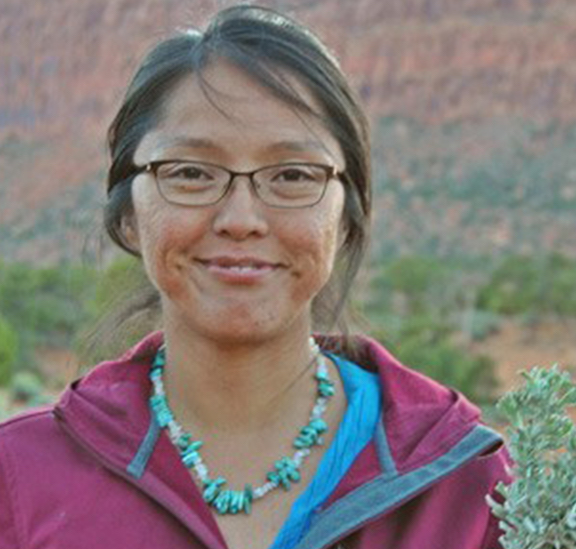
Aretta Begay
Aretta Begay is Diné (Navajo), of the Manygoats Clan, born for the Salt People Clan. She currently resides in Teec Nos Pos, AZ, where she also raises the Navajo-Churro Sheep. Currently, she works as Co-Coordinator of the Navajo-Churro Lamb Presidium and Director of Diné Be’Iiná (Navajo Lifeway). Diné Be’Iiná is a former Colorado Plateau Foundation grantee. Diné be’ iiná, Inc. is a grassroots, nonprofit organization founded in 1991. Diné be’ iiná, means the way that we, the people live. They promote a sustainable livelihood through the Navajo Way of Life. Traditionally, this has been sheep, wool, and weaving and whatever comes from that.
She has an academic background in Environmental Studies and Policy and is a professional Navajo translator. She is a sustainability educator and writer; understands traditional lifeways. She is passionate about traditional foods and cuisine, shepherding, fiber art and land stewardship.
In Aretta’s words, “As a member of the Navajo-Churro Lamb Presidium, I enjoy being a part of the greater Slow Food network and the great work we do with Indigenous communities on the Navajo Nation. As a presidium we collaborate with other local traditional Navajo elders, we ask their skills in butchering, plant and ceremonial methods of humanely slaughtering animals to consuming and preparing the foods. Our meat is sold to local restaurants/ chefs and caterers, who continue to be impressed by the quality of our meat, which is flavored by the desert medical herbs Navajo use, such as sage and tobacco plants. This greatly enhances the meat and well-being of the person consuming the meat; we believe they are also being blessed by the earth.”
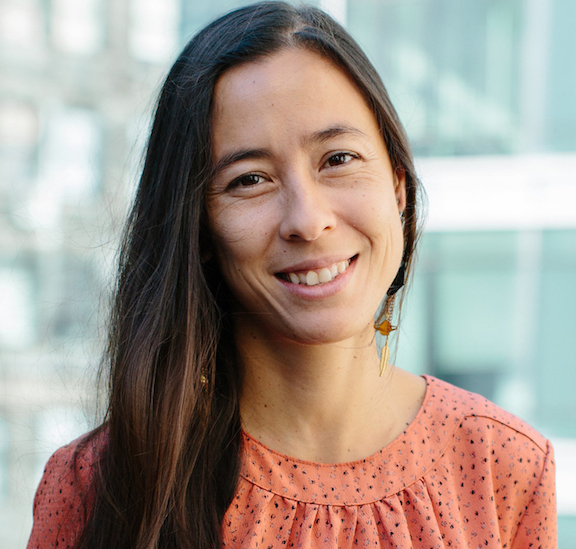
Alina Enggist
Alina Enggist is the Program Officer for the Trust for Mutual Understanding (TMU) and is based in New York City. TMU supports cultural and environmental exchanges between professionals in the United States and their counterparts in Central, East, and Southeast Europe; the Baltic States; Central Asia; Mongolia; and Russia. Alina joined TMU in August of 2010 after earning M.A. in socio-cultural anthropology from Columbia University. While completing her degree, she worked for Columbia’s human rights institute, Joseph Stiglitz’s Initiative for Policy Dialogue, and Columbia’s Arts Initiative, and before that worked for the Foundation for Contemporary Arts. Alina earned a B.A. degree in Philosophy with a focus on Ontology and Aesthetics from Boston College, and spent her first few years after college working in cross-cultural consulting in Princeton, N.J. and for several contemporary art galleries in New York City. She was introduced to the Colorado Plateau by her father who moved to New Mexico to pursue art. She is a collector of stones, stories, and salt.

Chef Franco Lee
Chef Franco Lee is White Mountain Apache living on the Navajo Reservation. He has been working with the Navajo Churro Lamb Presidium since 2013 in marketing and demoing their product. He has become familiar with traditional foraged and farmed foods during this time. Utilizing these foods, he has transformed traditional ingredients and Navajo Churro Lamb into some amazing dishes. In Chef Franco’s words, “food works in many ways. It provides us with energy, heals us, and nourishes our souls. Our traditional foods have many teachings behind them, significant to health, life, healing, ceremonial uses, and more.”

Tsianina Lomawaima
Tsianina Lomawaima (Mvskoke / Creek Nation and German Mennonite descent), scholar of Indigenous studies, is retired from the professoriate where she served as faculty at the University of Washington (1988-1994), the University of Arizona (1994-2014), and Arizona State University (2014-2020). Her scholarship on the federal off-reservation boarding school system is rooted in the experiences of her father, Curtis Thorpe Carr, a survivor of Chilocco Indian Agricultural School in Oklahoma, where he was enrolled from 1927 to 1935. Publications include the 2018 special issue of JAIE (Journal of American Indian Education) “Native American Boarding School Stories” Vol. 57 #1; “To Remain an Indian”: Lessons for democracy from a century of Native American education (2006; with Teresa McCarty); Uneven ground: American Indian sovereignty and federal law (2001, with David E. Wilkins); Away from home: American Indian boarding school experiences (2000; with Margaret Archuleta and Brenda Child); and They Called it Prairie Light: The Story of Chilocco Indian School (1994). She is a member of the American Academy of Arts & Sciences and the National Academy of Education. Co-founder of NAISA, the Native American & Indigenous Studies Association, Lomawaima has served on the boards of Arizona Public Media, the Hopi Education Endowment Fund, Western National Parks Association, School of Advanced Research, and the Buffalo Trust.
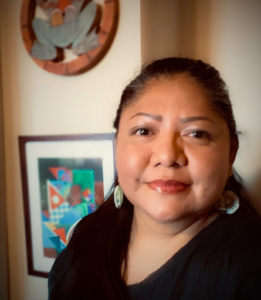
Monica Nuvamsa
Monica Nuvamsa is Omaw’wungwa (Water Cloud) Clan from the Village of Songoopavi and lives on the Hopi reservation in Northeastern Arizona. She was raised in a traditional farming family of multigenerational dry farmers, orchard keepers, food foragers and seed savers. She believes the value of observation and data collection of both the farming experience and seed preservation are a natural part of Hopi agricultural stewardship. She received her B.A. in Psychology and American Indian Studies and Certificate in Graduate Research from the University of Arizona and a Certificate in Nonprofit Leadership from the Arizona State University Lodestar Center for Philanthropy and Nonprofit Innovation in 2012. Monica is the Executive Director of The Hopi Foundation. Her tenure with The Hopi Foundation includes serving as the KUYI Hopi Radio General Manager as well as Hopi Foundation Associate Director of Programs for the Natwani Coalition, Hopi Leadership Program, Hopi Substance Abuse Prevention Center and Capacity Building Program. Monica serves on several local, regional and national nonprofit boards including the Arizona Community Foundation, Arizona Alliance for Nonprofits, and First Nations Development Institute. Her prior service includes the Native American Agriculture Fund, Native Americans in Philanthropy, Arizona Grantmakers Forum, Native Public Media and the Hopi Education Endowment Fund. Prior to working in the nonprofit and philanthropic sector, Monica started her career in the social service field with the Hopi Domestic Violence Program and received a political appointment to serve on intergovernmental affairs for the Hopi Tribe’s Chairman and Tribal Council. She returned to Tucson to work with the University of Arizona in the field of student services and undergraduate retention and later transitioned to the Morris K. Udall Foundation to manage the Udall Native American Congressional Internship Program in Washington, DC.

Sonja Swift
Sonja Swift co-directs Windrose Fund of Common Counsel Foundation, is board chair of the Community Agroecology Network and also serves on the boards of the Oakland Institute and Swift Foundation. She has consistently advocated for more accountability and coherency in the field of philanthropy and that funding go to Native organizations most knowledgeable about the places they live. Sonja hails from coastal foothills in the homelands of the yak titʸu titʸu yak tiłhini Northern Chumash, California while together with her family she also calls home in the unceded territory of the Očhéthi Šakówiŋ, in the Black Hills, South Dakota. She is committed to caretaking land, while she also maintains an art practice as a published writer. Sonja has a BA in Cultural Ecology from the University of California Santa Cruz, an individualized MA from Goddard College and a MFA in creative writing from California College of the Arts.
How We Support
We invest in the sustainability of Native-led organizations because the Colorado Plateau thrives when the staying power of Native-led organizations endures for generations.
We support both community and organizational capacity because we know that our grantees are working to protect the lands, waters, and cultures of the Colorado Plateau through community based work. Our grantee organizations do not operate in silos; instead, they understand that to create real change, communities must be empowered. At the same time, strengthening organizations from within is the key to ensuring that our grantees organizations continue their good work for years to come.
Community Capacity
Pueblo of Acoma’s Learning Center leveraged funding from CPF to develop a modern technology strategy in the preservation of the Acoma language, by creating a language app for community use.
A grant to Zuni Youth Enrichment Project helped fund a trauma informed, intergenerational learning program, grounded in Zuni history, story telling, language, and traditional agriculture
White Mesa Concerned Community strengthened their leadership capacity, advocacy, and community education outreach, to protect the local Ute community and surrounding areas from threats posed by White Mesa Uranium Mill.
Organizational Capacity
Advancing Communities Foundation strengthened their leadership and management skills to better support their work to protect the Colorado Plateau’s water, and specifically protect Hopi community health.
Hopi Tutskwa Permaculture developed a strategic plan, increased financial management, and provided board training, which supported their transition to a stand-alone 501(c)3 that supports community based agriculture for the Hopi reservation.
Utah Diné Bikéyah strengthened their board, developed a strategic plan, and improved communications, which enabled participation in the successful effort to establish the Bears Ears National Monument.
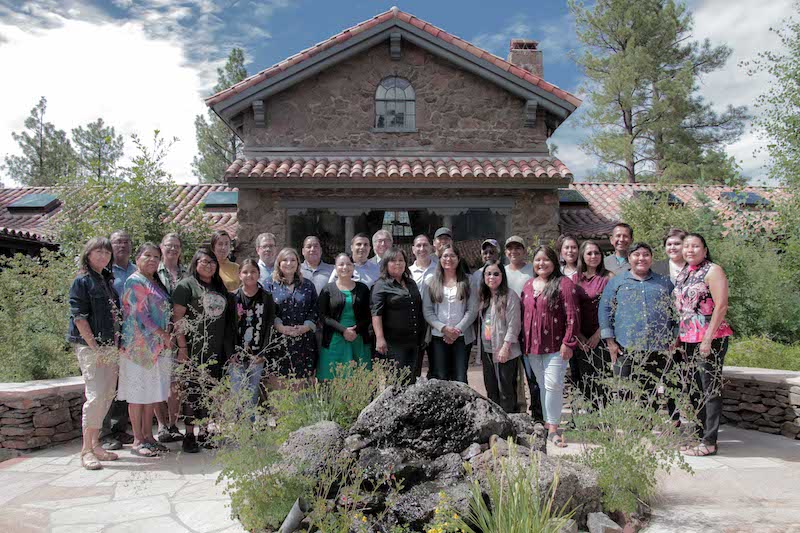
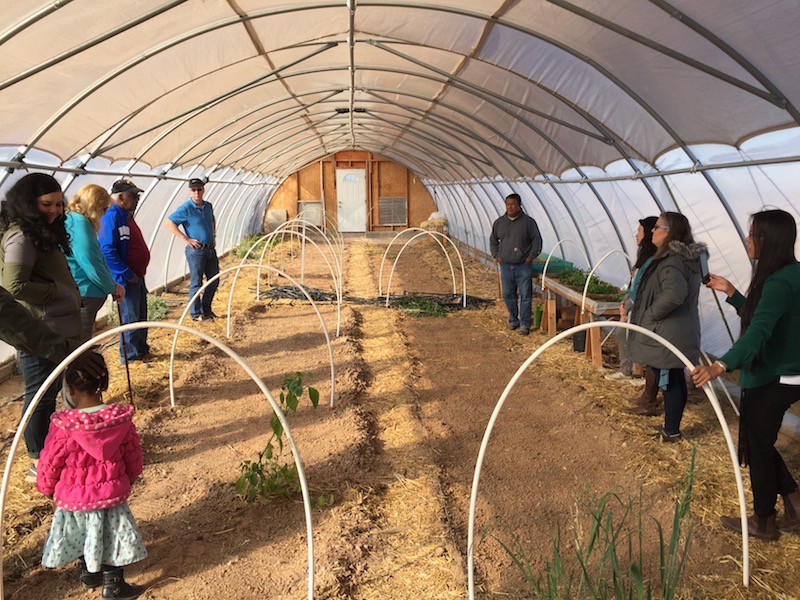
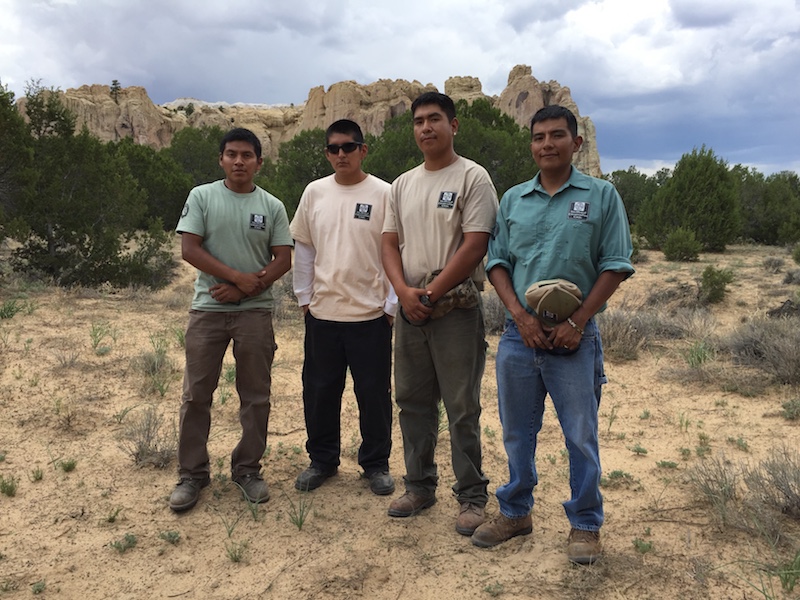
Frequently Asked Questions
The Colorado Plateau is centered in the southwestern United States, in an area termed the Four Corners region which extends into Colorado, Utah, New Mexico and Arizona. The following tribal nations govern the lands of over a third of the Colorado Plateau: Hopi, Zuni, Navajo Nation, White Mountain Apache, Hualapai, Havasupai, Ute, and Kaibab Band of Paiute.
The enduring Native presence on the Colorado Plateau renders this region one of the world’s richest bio-cultural landscapes. The Colorado Plateau is also ground zero for industrial development and extractive industries that threaten land, water, and culture. This unique dynamic requires strong Native leadership, and the movements built by the Colorado Plateau’s Native communities scale to regional, national, and global levels.
The Colorado Plateau Foundation is a Native-led foundation that supports the cultures, lands, and waters of the Colorado Plateau. The Colorado Plateau Foundation invests in Native-led organizations working in four priority areas on the Colorado Plateau – protection of water, protection of sacred places and threatened landscapes, preservation of Native languages, and sustainable community-based agriculture.
Jim Enote (Zuni) founded Colorado Plateau Foundation in 2012, in partnership with the David and Lucile Packard Foundation, Christensen Fund, and Arizona Community Foundation. The Colorado Plateau Foundation emerged to address a regional need for a bridge between the Colorado Plateau’s Native communities and the national philanthropic community in response to the lack of philanthropic dollars reaching rural, Native communities on the Plateau, despite both overwhelming need and the presence of established Native-led organizations who were leading transformative work.
Our grantmaking priorities are informed by tribal leaders from across the Colorado Plateau. Through a series of inter-tribal gatherings, cultural and community leaders from Colorado Plateau tribes identified our four priority giving areas as requiring immediate and sustained attention.
Philanthropic partners, both foundations and individual donors, are working with the Colorado Plateau Foundation to support Native communities. Our foundation partners include The David & Lucile Packard Foundation, The Christensen Fund, Entertainment Industries Foundation, Santa Fe Community Foundation, Swift Foundation, Arizona Community Foundation, and the Levinson Foundation, and Patagonia, among others.
The dynamics on the Plateau are complicated, and our familiarity and understanding of the issues in the region helps funders understand the power of Native organizations to drive change. We share our theory of change with foundations and individual donors to help them better understand how tribal-driven work fits into their portfolio of giving and the relevance of Plateau work to the larger world.
We value a culturally centered model of giving that meets grantees where they are at and then supports their growth into organizations capable of accomplishing sophisticated and positive change to protect the Plateau’s environment and cultures. We give capacity-building grants in amounts between $1,000 and $25,000 to organizations working in our four priority issue areas. Since 2012 we have given $1,200,000 to over 60 Native-led initiatives. Starting in 2018, we will begin granting for program support to repeat grantees who have built strong organizational capacity.
The Colorado Plateau Foundation’s approach begins addressing some of the philanthropic inequities on the Colorado Plateau. Less than .5% of national philanthropic dollars supports Native communities and Native-led initiatives. Of that amount, 74% is directed to urban initiatives, which excludes most of the vital work occurring on the Colorado Plateau. Moreover, 68% of philanthropic dollars intended to benefit Native people are granted to non-Native led organizations – disenfranchising the tribal leaders and communities conducting the work.
By directly giving to Native-led organizations and initiatives on the Colorado Plateau, the Colorado Plateau Foundation is supporting culturally-appropriate and culturally-grounded movements that have the potential to scale at a regional, national, and global scales.
